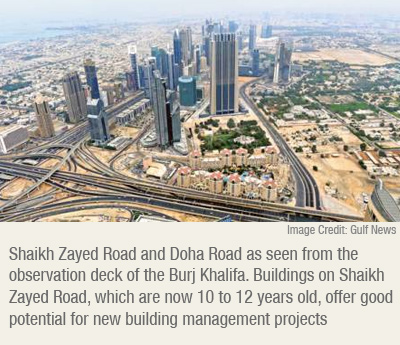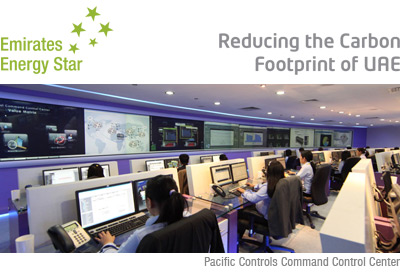
Press Releases
Pacific Controls helps high-rise buildings to reduce energy use
Along with etisalat, it is helming the Emirates Energy Star Programme

Mar 30 2012, Dubai: Another 99,992 properties to do. But you won't have the CEO of Pacific Controls, breaking into a cold sweat over these targets.
His company along with etisalat, is helming the Emirates Energy Star Programme, which will provide a centralised off-site management of the energy consumption across properties in the UAE. The intention is to optimally utilise the legacy equipment installed in these buildings and thus achieve energy cost savings for the properties and their landlords.
As of now, eight properties in different emirates — including one under the Ministry of Public Works — has been brought on board the Energy Star Programme, which was launched in December. (None of these properties is residential or operated as a hotel.)
The promoters plan to achieve around 50 per cent coverage of the 100,000 properties within the next three years or so.
"I don't foresee a great degree of difficulty in meeting the forecasts," said the CEO. "At this point of time we are going building by building… but the idea is to scale that to organisational levels or even at the city level.
"On the residential side, connectivity depends on the kind of property. If it's a villa complex, the programme can technically be applied, but will not be commercially feasible. We are in active talks with landlords owning residential towers on Shaikh Zayed Road. Getting some of them on board will gain us momentum.
"We know who the big developers are; the ones who have assets of 1,000 to 2,000 buildings. We do a proof-of-concept for them and roll it entirely. That's the whole approach.
"The primary savings that we are looking at is the kilowatt hour of electricity consumption. The moment you reduce that, automatically you are saving on costs."
Where the programme has a relatively easy path is that it relies on existing equipment within the buildings, irrespective of the age of the property. "With us managing them, energy consumption levels would automatically reduce by 20 to 30 per cent," said the CEO.
"Let's say a customer has 200 facilities. Then the savings run into the millions of dirhams. However, nobody is going to deploy them across all the facilities in one shot. They will like to try it out once, see the results happening and then they take it forward."

This is done through the rather grandiose sounding Global Command Control Center owned and operated by Pacific Controls. In simple terms, the handling of a particular building's energy management and upkeep is passed on to an off-site facility. For the landlords, it would mean they will not have to commit more resources of their own on the energy management side. This is a key cost factor and more so as the buildings age.
"It is all about getting the control from the building into our control room, which typically takes a week to two weeks at the most," said the CEO.
"The nature of the programme is to make sure all equipment that exists in buildings is included. That is why the payback period is less than two years. In some cases, we see the payback is two to three months.
"In terms of energy saving, it stands between 15-30 per cent; but the low-hanging fruits are those in the 10-20 per cent range, where you walk in and you optimise the operation immediately."
Is there a sentiment that the process could get progressively more difficult with older buildings?
"You can even turn around older buildings," the CEO added. "For example, some of the buildings on Shaikh Zayed Road, which are 10 to 12 years old, actually have a building management system, but not being utilised well. Those are the easy projects to get into.
"Then there are other projects with older designs and featuring a central air-conditioning system or those where every individual apartment or office has its own separate air-conditioning system. These become technically complex and commercially not that attractive."
Also, having etisalat as a partner provides the programme with its own impetus. "As long as there is etisalat coverage in a property, the connectivity is done through its SIM cards on the 3G network," said the CEO.
"Even in buildings or areas that use the services of etisalat's competitor, it doesn't really matter. The etisalat SIM card can still be used and that's all it takes for the building to be connected to the programme."
There are plans to replicate the programme in other markets. Getting a tele-com operator would ease the process, according to the CEO.
"At this point the focus is on the UAE, and for this to work in other markets the energy tariffs need to be on the higher side," he added.
"That's not the situation in most of the Gulf states and even in Abu Dhabi the tariffs are a third of those in Dubai.
"Broadly speaking any country which has high energy tariffs and significant real estate is a target market for us."

Recession's carbon effect
The recession had a hand in a lot of things, including on carbon trading.
"There was a point in time when carbon was highly priced," said Sougata Nandi of Pacific Controls. "Anybody selling carbon offsets was making a lot of money and then it went down.
"When economic activity goes down, by default carbon emissions are also going down. At that time, carbon emitters are not really interested on offsets because their footprint has gone down."
Meanwhile, Pacific Controls is heading towards the full commissioning of a new 80,000 square metre Data Center in Dubai. Apart from its own needs, the new storage capacity will also be leased to third-parties for their own data.

Gulf News
United Arab Emirates
